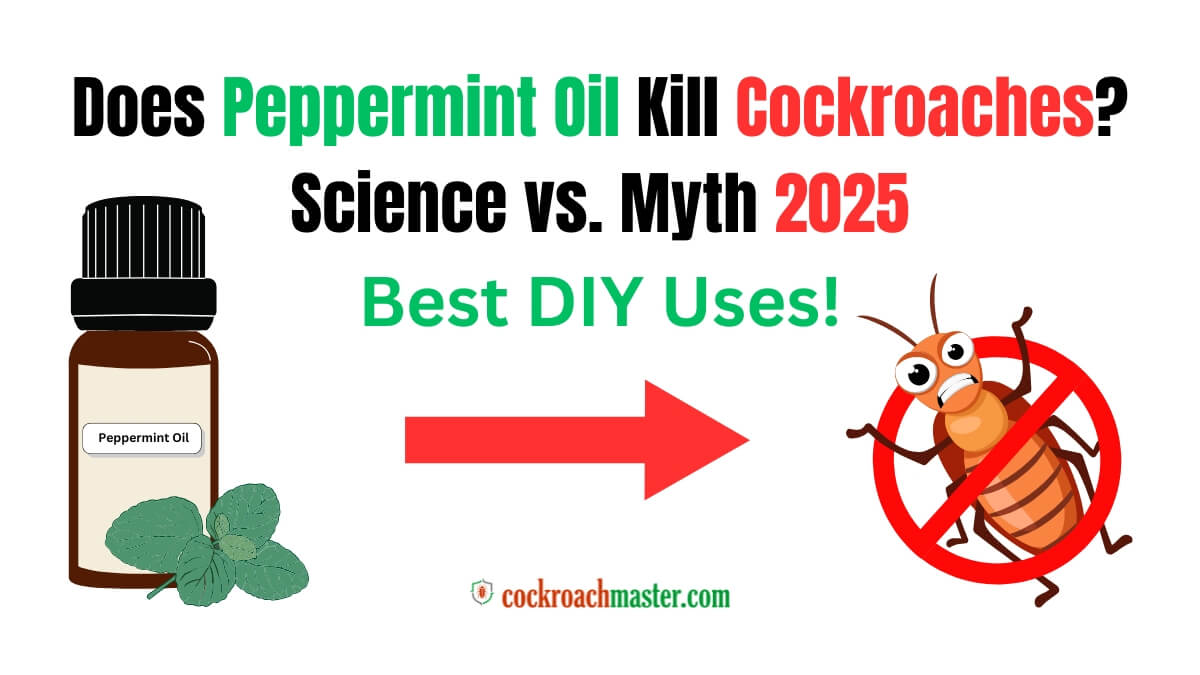
Cockroaches are among the most resilient pests, making homeowners search for natural alternatives to chemical insecticides. One popular remedy is peppermint oil, but does peppermint oil kill cockroaches effectively, or is it just another myth?
In this article, we’ll analyze the science behind peppermint oil as a cockroach repellent, discuss expert opinions, and provide a DIY step-by-step guide to using peppermint oil effectively.
Cite Credible Sources (Scientific Studies, Pest Control Experts)
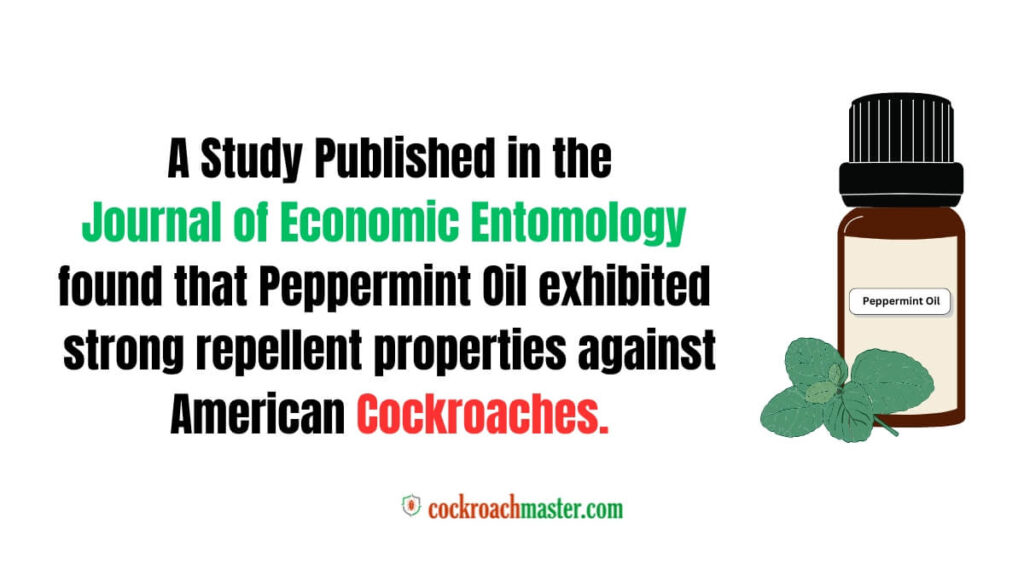
Several authoritative studies support the effectiveness of peppermint oil as a cockroach repellent:
- A study published in the Journal of Economic Entomology found that peppermint oil exhibited strong repellent properties against American cockroaches.
- Research from the National Center for Biotechnology Information (NCBI) highlighted that peppermint oil’s menthol component affects cockroach neural pathways, causing disorientation and discomfort.
- A Purdue University Study concluded that peppermint oil is effective as a repellent but may not necessarily kill cockroaches unless used in high concentrations.
Real-Life Case Studies
Anecdotal evidence shows that homeowners who use peppermint oil for pest manipulation see fewer cockroach sightings after consistent application. Forums, including Reddit and Quora, also function discussions from folks that claim success in using peppermint oil in a mixture with different pest manipulate measures.
Myth vs Reality
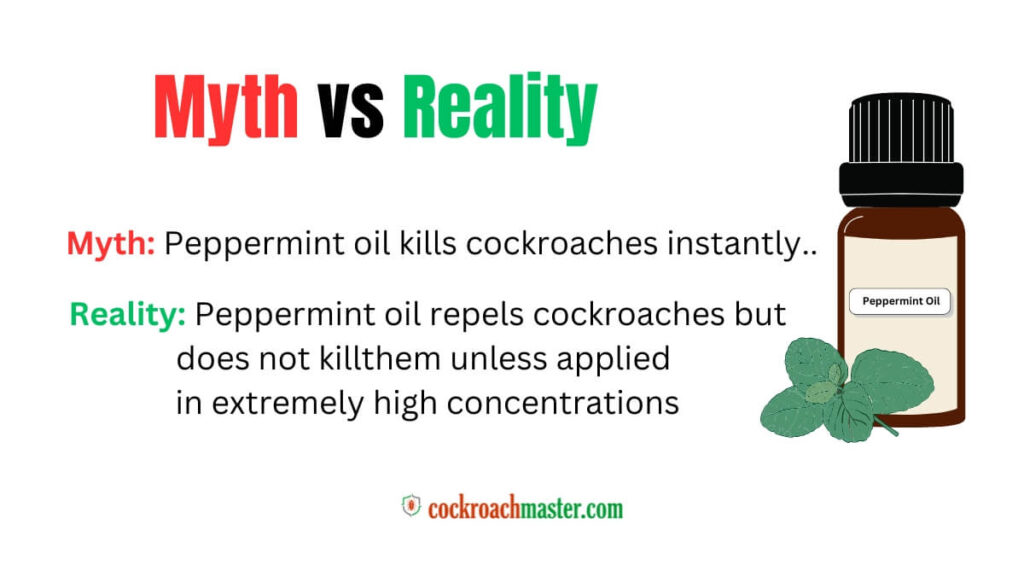
Myth: Peppermint oil kills cockroaches instantly.
Reality: Peppermint oil repels cockroaches but does not kill them unless applied in extremely high concentrations.
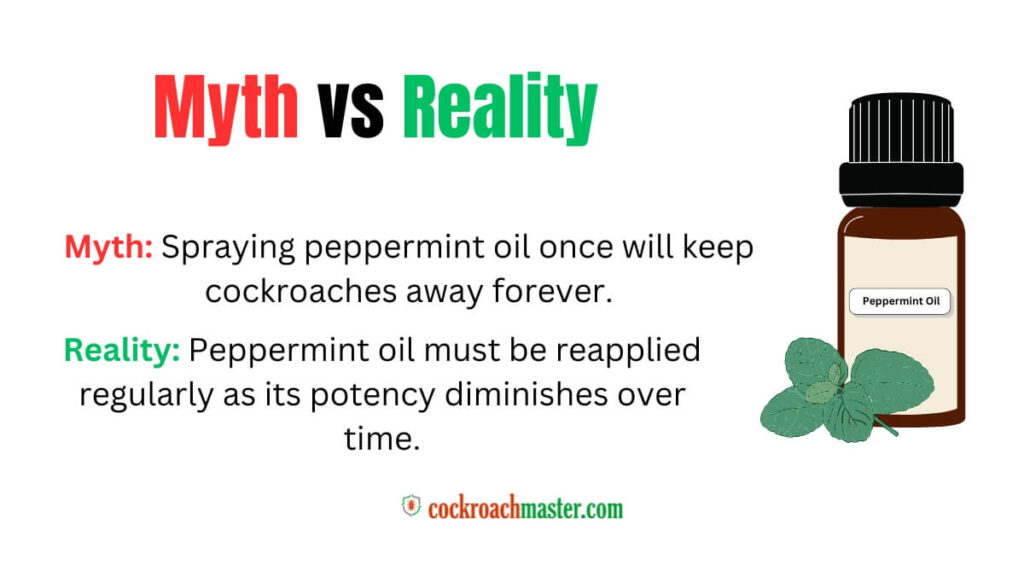
Myth: Spraying peppermint oil once will keep cockroaches away forever.
Reality: Peppermint oil must be reapplied regularly as its potency diminishes over time.
Step-by-Step Guide: DIY Peppermint Oil Spray for Cockroach Control
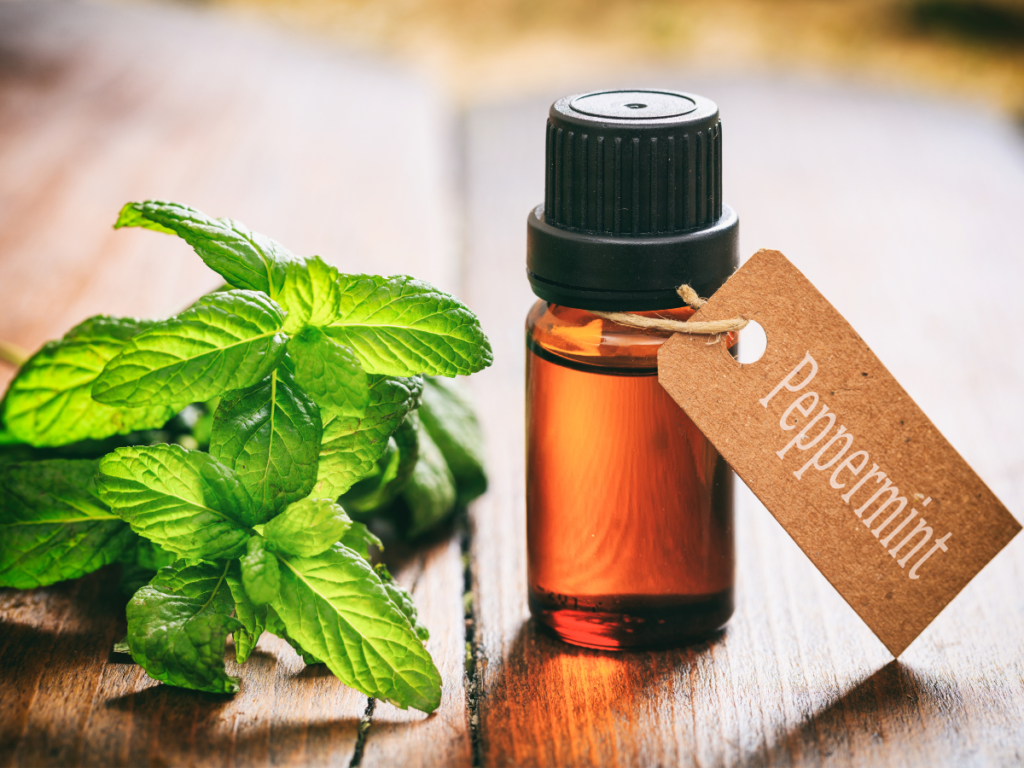
Keeping cockroaches away with peppermint oil is easy and inexpensive. You can either purchase ready-made peppermint oil or make your own solution at home. Here’s how you can prepare and use it effectively:
Step 1: Preparation of Peppermint Oil Spray
There are two easy ways to prepare a peppermint oil spray:
Using Store-Bought Peppermint Oil
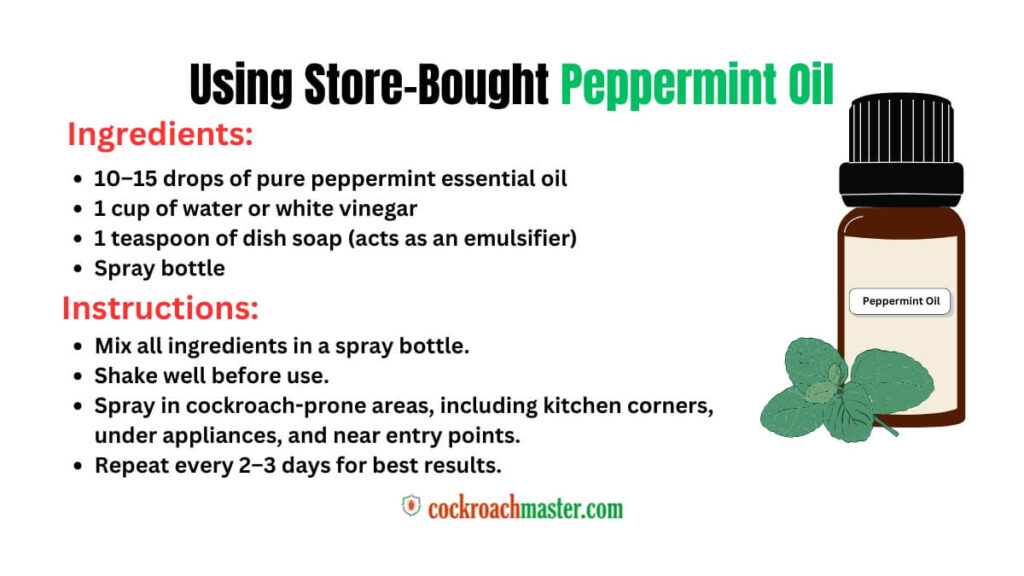
Ingredients Needed:
- 10–15 drops of pure peppermint essential oil
- 1 cup of water or white vinegar
- 1 teaspoon of dish soap (acts as an emulsifier)
- Spray bottle
Instructions:
- Mix all ingredients in a spray bottle.
- Shake well before use.
- Spray in cockroach-prone areas, including kitchen corners, under appliances, and near entry points.
- Repeat every 2–3 days for best results.
DIY Peppermint Oil Preparation from Peppermint Leaves
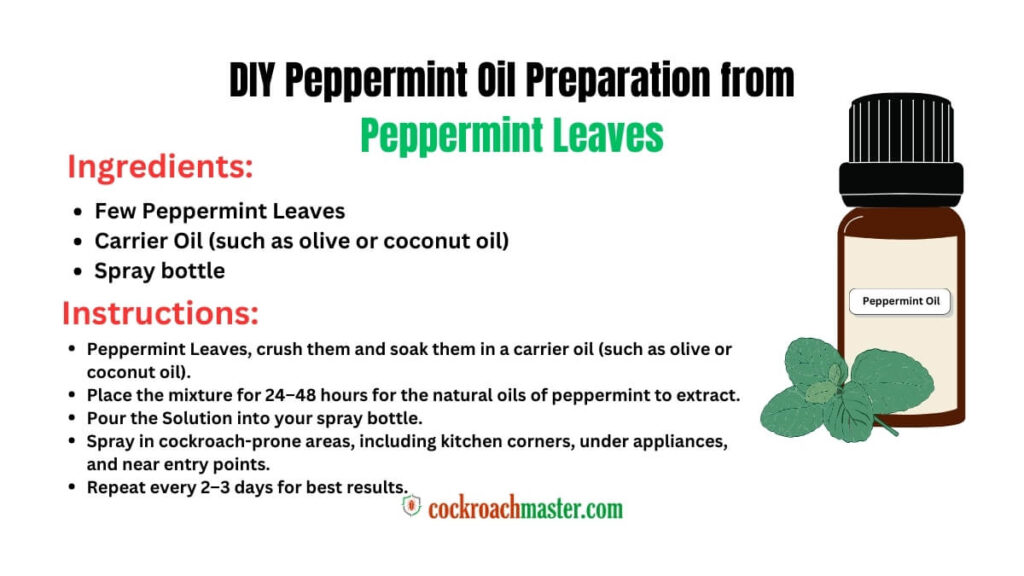
Ingredients Needed:
- Few Peppermint Leaves
- Carrier Oil (such as olive or coconut oil)
- Spray bottle
Instructions:
- Peppermint Leaves, crush them and soak them in a carrier oil (such as olive or coconut oil).
- Place the mixture for 24–48 hours for the natural oils of peppermint to extract.
- Pour the Solution into your spray bottle.
- Spray in cockroach-prone areas, including kitchen corners, under appliances, and near entry points.
- Repeat every 2–3 days for best results.
Step 2: Test the Solution
Try out the spray in a small, hidden area of your home before using it everywhere. In this way it won’t harm surfaces or cause any allergic reactions.
Step 3: Keep It Fresh
Peppermint oil degrades over time, so always shake the spray bottle before use to make sure the oil and water are mixed. The best results are to be prepared with fresh batches every couple of weeks.
So now that you have your peppermint spray ready let’s see where and how to put it in order to serve you best.
Where and How to Use Peppermint Oil
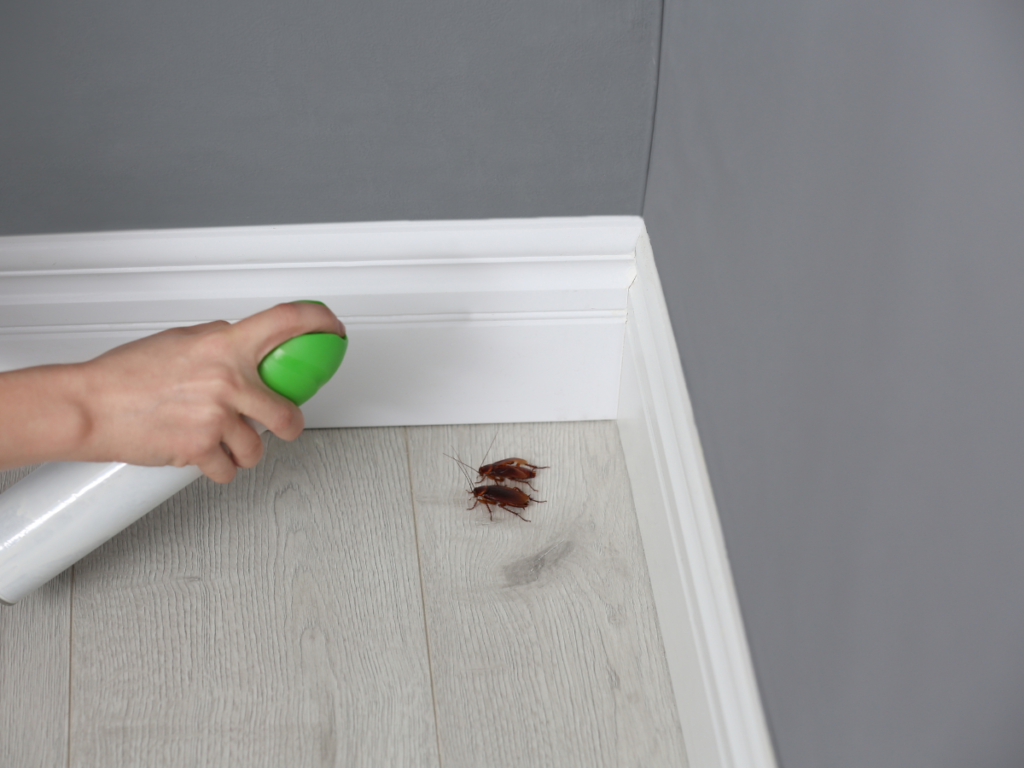
Knowing where and how to use peppermint oil is important to keep cockroaches away. Here’s a step-by-step guide to ensure you’re targeting the right areas in your home:
Key Areas to Spray
Cockroaches usually hide in dark, damp, and warm places. Focus on these areas when applying your peppermint oil spray:
- Entry Points: Use spray around doors, windows, or anywhere that can see cracks or gaps in the walls.
- Kitchen: Take extra special care on cabinets, under the sink, near the stove, and around trash cans.
- Bathrooms: Spray in areas near drains, at the bottom of sinks, and along baseboards.
- Storage Areas: Find places to target that was normally dark corners, closets, or places where boxes had accumulated and clutter had been stored.
Application Tips
- Spray Directly: Generously spray the solution onto surfaces where cockroaches may like to come or hide.
- Cotton Balls: Place peppermint oil-soaked cotton balls in the tightest of spaces, drawer, cabinet, or corner.
- Reapply Regularly: To get the most out of this, keep reapplying every 5–7 days or when the smell begins to fade. To keep cockroaches away, the smell has to be strong.
- Use a Diffuser: To keep the smell of peppermint constant in the whole room, an essential oil diffuser will help spread the peppermint aroma around the room.
Hard-to-Reach Spots
However, in areas like cracks or behind big appliances, you may not be able to spray. To ensure that these places get the smell of these pests, use peppermint oil-soaked cotton balls or sachet.
If you can hit these areas consistently, you can greatly reduce the cockroaches in your home. But it’s important to monitor the effectiveness and adjust if necessary.
Is Peppermint Oil Effective for Cockroach Infestations?
While peppermint oil can be a helpful tool for keeping your cockroaches at bay, it is essential to understand its strengths as well as its weaknesses. The strong smell of this natural remedy repels cockroaches as it’s overwhelming for them. But it doesn’t kill them.
Peppermint oil is a great option if you only have small infestations, or as a preventive measure. By being used regularly it can create a barrier that will keep roaches away from key areas such as your kitchen or bathroom. It is also a safe, non toxic solution for homes with kids and pets.
Peppermint oil is however only effective if you are currently dealing with small infestations. Roaches can adapt, and the numbers can make a difference, but with a repellent, it’s hard to control them. Combining the peppermint oil with other pest control methods such as traps or doing professional treatment will be better in such cases.
Peppermint oil is most effective when:
- Consistently apply to entry points and hiding spots.
- Combined with good hygiene practices, like keeping food sealed, cleaning up crumbs.
Overall, peppermint oil is an excellent first step natural pest control, but it is not a cure all. Still, for bigger problems professional help may be needed.
Alternative Natural Remedies to Peppermint Oil
If peppermint oil isn’t getting rid of your cockroach problem, or if you want a stronger weapon, there are many other natural remedies to try. Of course, all these options are safe and eco-friendly, and surprisingly, they work well with peppermint oil to keep cockroaches away.
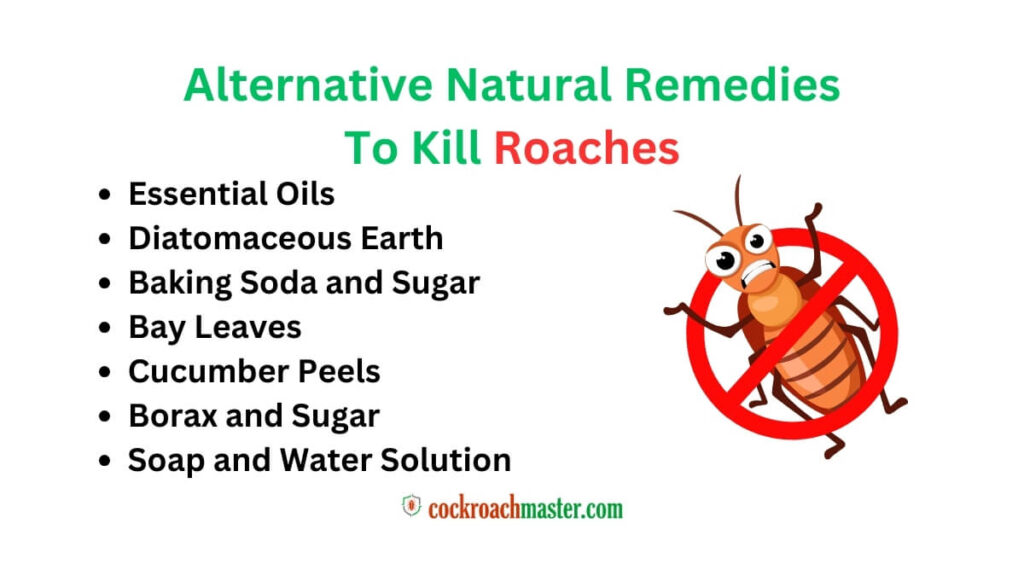
Essential Oils
The strong scents of a number of essential oils repel cockroaches, so they are a commonly used natural remedy. Here are some great alternatives to peppermint oil:
- Tea Tree Oil: Tea tree oil is known for its antimicrobial properties making it a cleaner and a repellent in one. Spray the mix 10–15 drops with water and spray in areas where roaches are present.
- Eucalyptus Oil: However, its sharp camphor like aroma is very effective at deterring cockroaches. Put a few drops in water or into a diffuser and that will keep them at bay.
- Lavender Oil: Lavender oil is milder in scent, but can work well if consistently applied. In addition, it helps leave your home smelling fresh and fresh.
These oils are rotated or combined together to maximize the impact. Repeated usage of these can make it an uncomfortable environment for cockroaches.
Diatomaceous Earth
It is a natural powder made from fossilized algae. Although it is harmless to humans and pets, it is deadly to cockroaches. It’s a powder that’s damaged their exoskeleton, dehydrates and kills roaches when they come in contact with it.
- It’s sprinkled around entry points, behind appliances, and in dark corners where cockroaches have been known to hide.
- For safety, use food-grade diatomaceous earth and reapply after cleaning or after being wet.
This method is particularly powerful because it works over a long period of time as long as it stays dry.
Baking Soda and Sugar
This is both an inexpensive and surprisingly effective solution.
- Mix equal parts baking soda and sugar. The sugar attracts the cockroaches because they like it, and the baking soda reacts with the cockroach’s digestive systems and kills them.
- Mix the mixture in small dishes or sprinkle it around the area where it’s used, like under the sink or behind cabinets.
You can use this to improve results—refresh your mixture every few days, especially when it’s humid.
Bay Leaves
Their strong smell makes them also a natural cockroach repellent. These are especially useful in places where sprays and powders won’t be okay.
- Without going into any effort, crush some bay leaves and place them in drawers, cabinets, and shelves.
- For large areas, place bay leaves in sachets and hang them in problem areas.
It’s safe, cost-effective, and easy to use in areas where food is stored.
Cucumber Peels
Therefore, cockroaches hate the smell of fresh cucumber peels and because of this they hate cucumber peels. It’s not a long term solution, but it’s great for temporary relief.
- Cucumber skins can be placed near trash cans or inside cabinets to vibrate high-activity areas.
- To maintain effectiveness, replace the peels every 2–3 days.
Cucumber is a perfect, safe, and natural choice for kitchens and food storage areas.
Borax and Sugar
Just as with the baking soda approach, cockroaches can be killed by mixing borax with sugar.
- Mix borax and sugar in equal parts and sprinkle it in cracks, under sinks, and around baseboards.
- Borax should be kept out of the reach of pets and children—you don’t want your pet to ingest it and get sick.
However, this method is particularly effective when you have a large problem, because it targets many cockroaches at one time.
Soap and Water Solution
Using soapy water is a quick and easy way to get rid of cockroaches.
- Spray a few drops of dish soap with water into a spray bottle.
- Spray cockroaches on sight. They get choked to death by the soapy mixture clogging their breathing pores.
It’s not a prevention, it’s an easy solution for roaches that appear suddenly.
Seal Cracks and Holes
Blocking cockroach entry points is one of the best ways to prevent a cockroach infestation.
- Use caulking or weather stripping to seal gaps in walls, floors, and around windows.
- Focus on areas near pipes, drains, and vents, where they are potential access points.
In addition to being a good pair with other natural remedies, it also helps reduce chances for new cockroaches to enter your home.
Combining Remedies
For the best results, use a mix of these methods:
- In open areas, spray peppermint oil to keep cockroaches away.
- Hidden places where they may go are place diatomaceous earth or borax mixtures.
- They can be repelled naturally with bay leaves or essential oils used in cabinets and drawers.
Using these natural remedies in combination, you can form a multi-layered protection from cockroaches that is not only is repelling, but also decreases the possibility of them reoccur.
Safety Tips and Considerations
Natural remedies such as using the peppermint oil are better when it comes to using pesticides, however one must be careful when one uses them. By following these safety tips you are protecting your family, your pets, and your home from cockroaches.
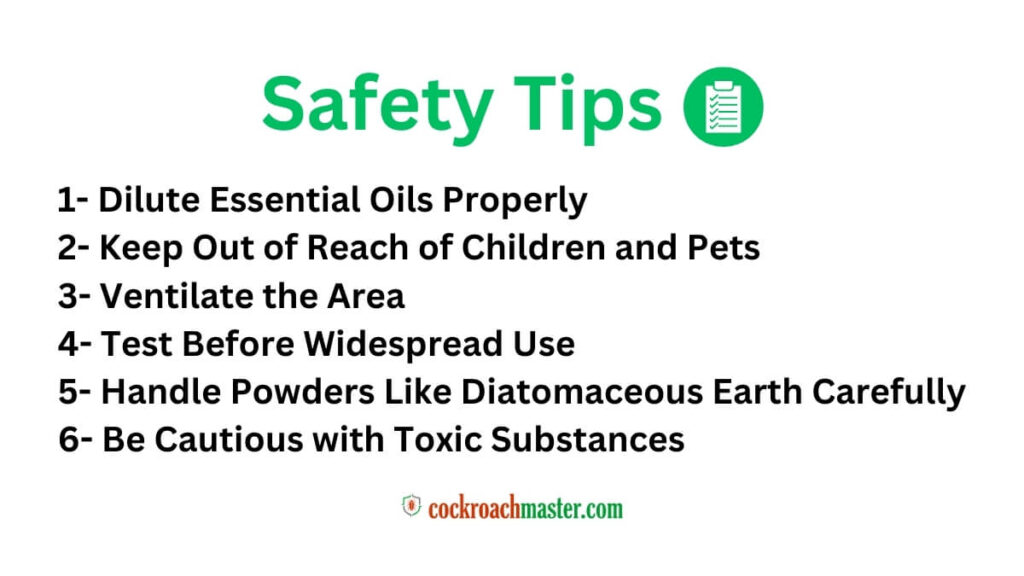
1- Dilute Essential Oils Properly
Peppermint and other essential oils are very concentrated, and can be irritating if used undiluted. You must always mix them with water or a carrier oil like coconut or olive oil. Sprays require just a few drops in a cup of water. Do not place directly on skin or applied near eyes to prevent irritation.
2- Keep Out of Reach of Children and Pets
Essential oils are natural but can be harmful when ingested. Keep all mixtures safely stored, and don’t spray where it can reach pets, such as a pet’s food or sleep area. You should monitor pets for any signs of sensitivity, like sneezing or lethargy.
3- Ventilate the Area
Perrtictle oil has a strong smell that can be overwhelming in closed areas. Keep open windows or use fans to allow proper airflow while and after use. This will prevent discomfort for those who are sensitive to strong odors.
4- Test Before Widespread Use
Peppermint oil or powders should be applied only in small areas before being widely used. It prevents surfaces from being damaged or reactions for family or pets. In case of irritation, stop using.
5- Handle Powders Like Diatomaceous Earth Carefully
Use food grade versions of diatomaceous earth and handle carefully. Stay away from the area, and if you have to stand near the area, wear gloves and mask to avoid inhalation of fine particles which can be irritating on the lungs. Apply it dry for best results.
6- Be Cautious with Toxic Substances
If using borax, make sure it is in places children and pets can’t access. While toxic, it is an effective procedure. If there are spills, clean them up immediately, and don’t go in with too much to maintain risk levels.
If you follow these simple precautions you can safely and effectively use natural remedies to eliminate cockroach problem in your home.
Conclusion: Does Peppermint Oil Kill Cockroaches?
While peppermint oil can repel cockroaches effectively, it is not a standalone solution for infestations. Using it in combination with preventive measures like sealing cracks, cleaning food residues, and using bait traps will yield the best results.
Try DIY Peppermint Oil Spray today and keep your home cockroach-free naturally!
FAQs: Does Peppermint Oil Kill Cockroaches?
How effective is peppermint oil against cockroaches?
Peppermint oil is highly effective as a repellent, but it does not kill cockroaches unless applied in high concentrations directly on them.
How often should I apply peppermint oil to keep roaches away?
To maintain effectiveness, peppermint oil should be reapplied every 2-3 days or after cleaning the treated areas.
Can I mix peppermint oil with other essential oils for better results?
Yes! Combining peppermint oil with tea tree oil, eucalyptus oil, or lavender oil can enhance its repellent properties.
Does peppermint oil kill cockroach eggs?
o, peppermint oil does not penetrate cockroach eggs. A combination of insect growth regulators (IGRs) and traps is needed for egg elimination.
What are the best places to apply peppermint oil for cockroach control?
Apply it in kitchen corners, under sinks, near trash bins, along baseboards, and entry points where cockroaches are likely to hide.
Are there any risks to using peppermint oil for pest control?
While peppermint oil is safe for humans, it can be toxic to pets in high concentrations. Always dilute it properly before application.
Can peppermint oil completely eliminate a cockroach infestation?
No, Peppermint Oil should be used as a preventive measure. If you have an infestation, consider combining it with traps, baits, and professional pest control.




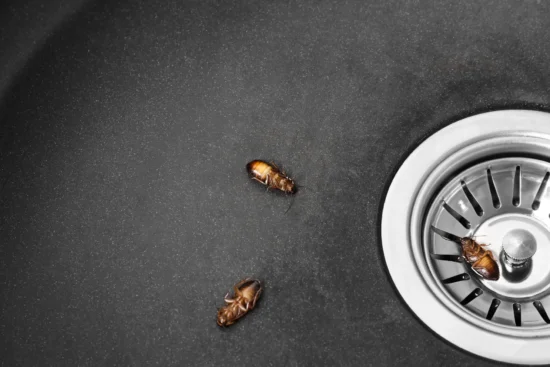

Comments (2)
How to Remove Cockroaches in Bedroom: Expert Guidesays:
December 14, 2024 at 3:33 am[…] Essential oils like peppermint, tea tree, and eucalyptus, can be natural repellents to deter cockroaches from entering your bedroom. You can mix a simple few drops of oil with water in the spray bottle and then spray wherever you’ve seen roaches or where you see they might be hiding. Instead of that, you can also place bay leaves, cucumber slices or garlic in the unseen corners of your bedroom to keep them away. You can get more information about the peppermint oil in this guide. […]
10 Shocking Facts About Smoky Brown Cockroachessays:
January 28, 2025 at 10:13 pm[…] If your home has moisture issues, you’re more likely to attract them. Keeping areas dry and well-ventilated is key to preventing infestations. […]